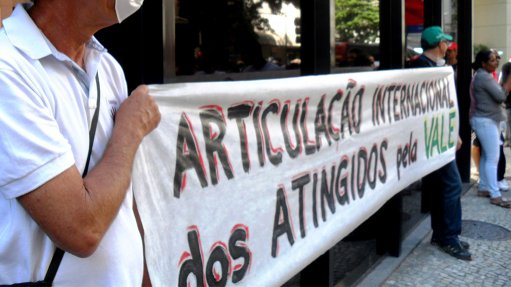
PROTEST PROBLEMS Vale’s mines in Brazil were affected by 14 community-led protests, which resulted in losses of $400-million for the company in 2014
Photo by: Fabiola Ortiz/IPS
Community engagement is critically important to ensure the safety, security and sustainability of any mining operation, stresses Brazilian mining major Vale corporate security and crisis manager Ademar Barros Moura Filho.
“Community protests are currently the greatest challenge for our mining operations in Brazil,” he highlights, adding
that Vale’s mines in Brazil were affected by 14 community-led protests in 2014, which resulted in losses of $400- million for the company.
Vale contributes significantly to the communities in which it operates through taxes, royalties, employment and business opportunities, as well as social programmes, but disputes do arise from “time to time”, he says.
“We have teams worldwide that are dedicated to mitigating these social impacts, as expectations are complex and involve multiple stakeholders with different and constantly evolving interests.”
He says that, in some instances, Vale’s operations and mineral reserves are located on or near lands owned or used by local groups – including indigenous and aboriginal people – and other stakeholders.
“Some of these indigenous peoples might have rights that they can exercise to review or participate in natural resource management, and we consult and negotiate with them to mitigate the impact of our operations or to obtain access to their land.”
Filho adds that some of Vale’s mining and other operations are located in territories where a mining right might have been awarded in areas earmarked for agriculture or land-reform purposes, which might cause disputes or uncertainty among landowners, local communities and government.
“We make every effort to consult and negotiate with these groups to reach a common agreement on land access,” he says, but adds that disagreements with these groups have occasionally caused delays at operations.
Further, protests can adversely affect Vale’s reputation or hamper its ability to develop reserves and conduct operations, he notes, citing the temporary suspension of the company’s coal transportation system for a few weeks in Mozambique in April 2014. One of the locomotives was shot at nine times, which resulted in the driver of the train sustaining leg injuries.
During Mozambique’s general elections in October 2014, Vale activated its local crisis committee team (CMT) to follow the political situation and evaluate the safety risks for its employees, mines and rail infrastructure.
The CMT monitored an increase in kidnappings in the country, as well as the Ebola outbreak, to assess if any of the company’s operations were at risk in 2014; it also assessed the impact of the cholera outbreak and its potential impact on Vale operations in January this year.
“The CMT is critically important to Vale, as it assists us in predicting potential risks and averting crises by gathering valuable intelligence from local sources,” he emphasises.
Filho was speaking at business- to-business events organiser Fleming Gulf’s 2015 African Mine Security Summit, held in Johannesburg last month.